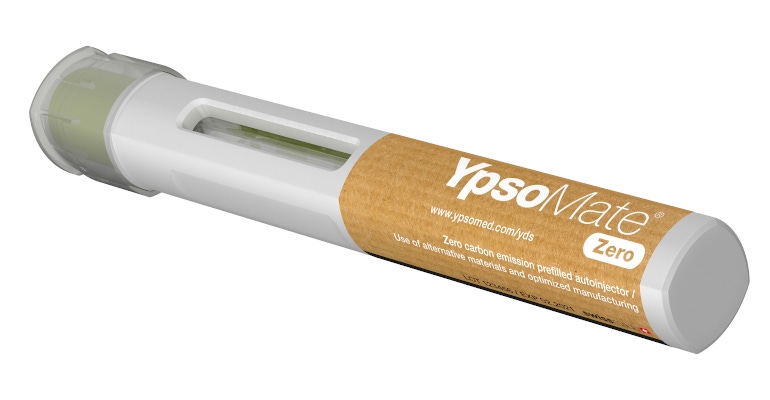Developing a Zero-Carbon-Emission Autoinjector
Ypsomed reported using more sustainable plastics instead of conventional plastics for the YpsoMate Zero.
December 4, 2020

Using biopolymers and taking a circular product design approach, Ypsomed has developed what it calls “the world’s first zero-carbon-emission prefilled autoinjector.”
"We must take responsibility for the environmental effects of our products. This is why we develop injection devices that minimize the impact of self-medication on the environment," stated Ypsomed’s CEO Simon Michel in an announcement of the YpsoMate Zero.
When developing YpsoMate Zero, it was important that Ypsomed “not only reduce the carbon footprint but also the overall environmental footprint,” Thomas Kutt, head of investor relations for Ypsomed Holding AG, told MD+DI. He said the company applied the following principles:
Avoid the usage of fossil-based materials.
Use biopolymers that should not compete with food.
Leverage materials that are based on certified renewable feedstock.
Apply a material balance principle.
Evaluate waste materials such as recycled plastics where applicable (and available).
“We replace most of the conventional plastics in the YpsoMate Zero with more sustainable plastics made from waste such as recycling plastics, biogas, tallol, or cellulosic,” said Kutt. “They all fulfill the regulatory requirements for medical devices. Most have not been used for medical or pharma before.”
The company also implemented a circular product design process in its early stage development. “We have been inspired by the Ellen Mc Arthur Foundation, which is the leading association in the Circular Economy way of thinking.” He said that three main principles were applied:
Design out waste and pollution.
Keep products and materials in use longer.
Regenerate natural systems.
“Starting with a life cycle analysis, we identified the main levers such as packaging design and materials used for the product itself,” Kutt continued. “Different options were investigated for the packaging design, such as the use of cellulose fiber trays, reuse of trays, and trays made of recycled plastics.”
Companywide transformation can take time. Kutt said that “implementing the different processes needs some time, and we want to do it the right way. Therefore we set ourselves the corporate target to become CO2 neutral by 2030. However, and most importantly, the YpsoMate Zero as a carbon neutral autoinjector offering will be available much earlier.”
He added that YpsoMate Zero is based on the company’s proven autoinjector platform. It “has been implemented multiple times with various customers around the world,” he said. “The testing and regulatory steps are thus similar to the proven standard YpsoMate autoinjector platform.”
About the Author(s)
You May Also Like



.png?width=300&auto=webp&quality=80&disable=upscale)
